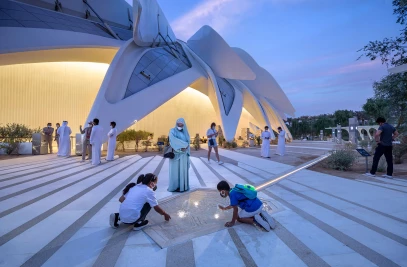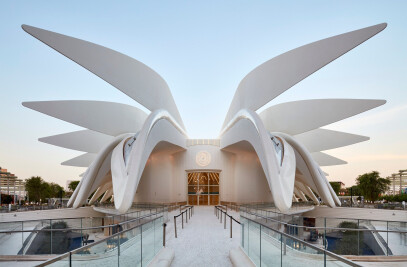THREE SANTIAGO CALATRAVA-DESIGNED BRIDGES TO AMPLIFY GROWTH IN CHINESE CITY OF HUASHAN
Located in the Central Chinese Province of Hubei, the Huashan Bridges Will Facilitate Cars, Pedestrians and Cyclists across the City’s Newly-Constructed Yangtze River Canal
Santiago Calatrava has been hired to design three landmark road and pedestrian bridges in the rapidly expanding Chinese city of Huashan. Huashan is situated approximately 20 kilometers east of Wuhan, the capital of Hubei Province in central China. These three iconic steel bridges will span 1.5 kilometers of the new Yangtze River canal, which connects to feeder lakes of the Yangtze River. The trio of bridges, called Xihu, Xianbi and Lincong, will facilitate vehicles, cyclists and pedestrians between the two sides and along the banks of the rapidly developing city. The construction of these bridges is central to the development of Huashan’s new urban center.
“Architecture is one of the art forms best able to improve and revitalize cities both artistically and functionally,” said Mr. Calatrava. “The Huashan project is a clear example of how an urban element, key to the successful growth of the city, can at the same time improve the quality of life for its citizens, thanks to an integration of all three bridges and the creation of boulevards on the banks of the canal.”
Calatrava designed the bridges so they are carefully integrated with the pedestrian and cyclist routes through a series of stairs and ramps. These routes also provide key access points between the road and the promenade pathways at the canal level. These spaces create links to a shopping boulevard on the northern bank of the Yangtze River canal and provide accessible public spaces, enhanced by unique lighting concepts and indigenous landscaping.
The Xianbi Bridge, the central bridge, is 129 meters long with an arch extending 42.3 meters high and incorporates two traffic lanes with a support structure in the center, creating a characteristic void. The westernmost Xihu Bridge is designed with a single arch and is connected via a platform of inclined corrugated cables. It is 102.7 meters long and the tied arch reaches 20.4 meters. The easternmost Lincong Bridge, which has two arches inclining outwardly away from the bridge, is 118 meters long and 26.1 meters high. All three bridges have a pedestrian stairs allowing pedestrians to cross the channel directly from the lower level. Construction is anticipated to begin in late 2016.

































